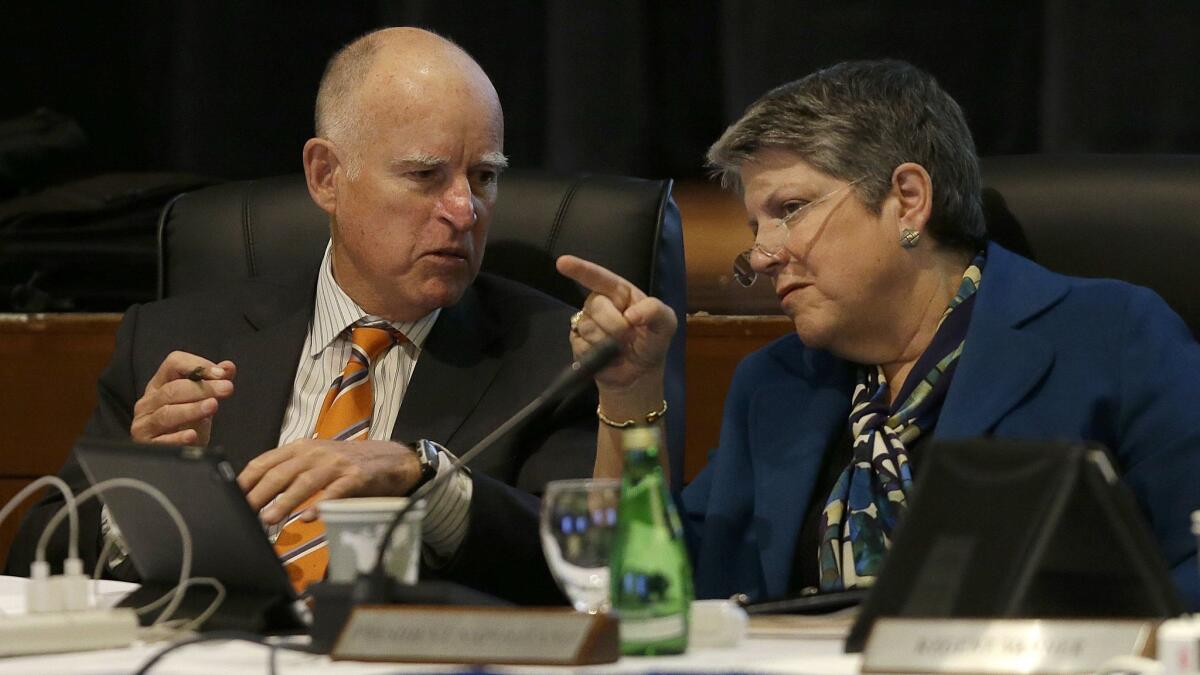Op-Ed: When California and the UC system fight, the state’s kids and its economy lose

Sacramento and the University of California should learn to get along.
Gov. Jerry Brown is withholding $50 million from UC in his budget proposal. State Sen. Ed Hernandez (D-Azusa) wants to amend the California Constitution so the Legislature controls funding for the UC Office of the President and can reshuffle the Board of Regents. And another state senator, Cathleen Galgiani (D-Stockton) suggests that any time UC pays a certain number of administrators more than the governor earns, it should face restrictions, including on its ability to raise tuition.
All of this stems from a state audit — the eighth related to UC in four years — released in late April. It accused UC President Janet Napolitano’s office of maintaining a secret fund of $175 million, when everyone knows UC has been crying poor. The audit also excoriated UC for paying administrators more than other public-sector employees in similar jobs, and accused Napolitano of interfering with surveys that campuses filled out as part of the audit.
These are serious accusations. They should be examined carefully — much more carefully than legislators did during their slug fest in early May, where they made it sound as though Napolitano had absconded with students’ tuition payments and used the dough to stash Bentleys in the garage at the UC president’s mansion.
When it comes to UC’s hoarding a nest egg instead of spreading the wealth to individual campuses, it’s the audit, not Napolitano, that should be questioned.
If Napolitano intentionally interfered with the audit — a question the Board of Regents is examining — she deserves appropriate discipline. She previously had agreed, well before this audit was conducted, that the salaries of many UC administrators were too high, and she already has put forward a plan for correcting that.
But when it comes to UC’s hoarding a secret nest egg instead of spreading the wealth to individual campuses, it’s the audit, not Napolitano, that should be questioned.
The audit referred to programs that the auditor, Elaine Howle, appeared to find sketchy, or at least not of direct benefit to students. But those programs include UC’s center in Washington, where students from all campuses who are interested in public service can live and take courses. They also include specific efforts to help UC students who are in the country illegally during a fearful time for them. Napolitano says all the “secret” stash is earmarked for approved university programs, except for less than $40 million set aside as a “prudent” reserve.
Howle’s complaint in return is fair enough: At the time of the audit, Napolitano’s office couldn’t come up with appropriate proof to show precisely how the $175 million was being spent. Howle also said, however, that she had found no signs of anything nefarious. And Napolitano quickly produced a plan to fix the bookkeeping problems.
Although that should be enough for the governor and the Legislature, Brown and our representatives are grandstanding, talking about punishing UC by withholding funds that might be needed for actual education and exerting more control over UC through the president’s office.
These are the same state officials spending tens of billions of dollars on the Local Control Funding Formula that was supposed to bring extra funding straight to public school students in kindergarten through 12th grade who need it most — poor kids, foster kids and those who don’t speak English. Loose rules for its use have meant that the money often goes to everyday basic instructional expenses instead of extra help for the students intended.
Meanwhile, UC’s campuses have repeatedly been ranked among the best for their excellence and value, as well as their success in graduating low-income students.
Napolitano, who has experience running a state (Arizona, as governor) as well as the Department of Homeland Security, hasn’t been a get-along gal with Brown and the Legislature. Good thing, too. If she had, UC would have been so badly underfunded over the past few years that it would be seriously deteriorated by now.
In 2014, Napolitano played hardball, threatening to raise tuition if more state money wasn’t forthcoming. She got her deal, but Sacramento doesn’t appear to have forgiven her. (And after six years of no tuition increases, it will go up $336 in the fall.) Unlike her predecessor, Mark Yudof, Napolitano is not the most diplomatic UC leader. She often waits too long to respond to legitimate criticisms. But she’s been a strong president, and that’s what UC needs when the governor seems intent on tarnishing its luster and the Legislature wants more control (a truly bad idea — running a university isn’t a job for politicians).
If there’s a big problem at UC, both sides should agree on an independent, outside organization — not an auditing agency that works for the governor — to examine the situation, and where California’s great research university system should go from here. The rancor between UC and state leaders over the past few years isn’t good for the university, California or the state’s high-achieving students who rely on it for an affordable, first-rate higher education.
Karin Klein writes about education for The Times editorial board.
To read the article in Spanish, click here
Follow the Opinion section on Twitter @latimesopinion and Facebook
More to Read
A cure for the common opinion
Get thought-provoking perspectives with our weekly newsletter.
You may occasionally receive promotional content from the Los Angeles Times.











